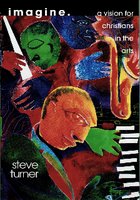
Authored by Steve Turner, Intervarsity Press, 2001, 132 pages, $10.99
Recently published in Japanese, by Word of Life Press, under the title: 『イマジン』芸術と信仰を考える
Reviewed by Paul Nethercott
Imagine numerous Japanese churches where creativity is embraced and enjoyed as part of what it means to be made in the image of God. People are energized as they explore their gifts and abilities, sharing them with each other.
Imagine expressive, creative worship services that include a wide variety of art forms, believers are deeply impacted and many not-yet-Christians attend to see and hear what is happening. An authentic Japanese “voice” (style) of worship is produced.
Imagine several accomplished Japanese movie directors, who are Christians, making major films for mainstream audiences. Their churches bless and affirm them. While the movies are primarily good entertainment, millions of Asians who see them notice a different viewpoint. Many begin to ponder the meaning of life and wonder if there really is a creator God after all.
Imagine visual artists, designers, writers, musicians, dancers, TV producers, radio announcers, actors and actresses, who are Christians, producing some of the best work in the artistic world in Japan. They are “salt and light” in their circles of influence.
Can these things happen? Yes, they can and to some extent are already happening (the late author Ayako Miura and painter Makoto Fujimura are two excellent role models). Turner’s book imagine (recently published in Japanese) provides a solid Biblical rationale for Christians to embrace their creativity and actively engage in mainstream culture. In his view, far too many Christians isolate themselves from society due to a destructive, “dualistic” (sacred/secular) view of the world that is not Biblical. This results in a “Christian ghetto” syndrome where the church becomes distant and isolated from society, unable to relate to others as human beings.
Imagine provides not only a sound rationale for connecting with mainstream culture, but examples of Christians who have successfully done so. Tuner’s book is an exciting “roadmap” showing how we can effectively engage with mainstream culture without losing our integrity.
In easy to understand language, Turner successfully presents a vision for embracing our creativity as humans while living under the Lordship of Christ in a fallen world. While he strongly endorses the validity and value of art, he does not ignore the issues that have driven some followers of Christ to fear and reject it. He believes that Christians should be involved in every level of the art world and in every media, for the glory of God.
The one regrettable part of this book is the sub-title “a vision for Christians in the arts.” It is misleading, as this book is a “must read” for all Christians, not just for those few who are professional artists. Imagine deals with the core issue of how humans, created in God’s image, can live God-honoring lives in a fallen world. For those of us involved in ministry in Japan, Imagine is an important and timely book that deals with critically important issues to each one of us.
<><><><><><><><><><
Quotes from the book imagine:
“Evangelical Christians traditionally had taken redemption as their starting point to anything. Had the artist been reborn and was the artist singing, writing or painting about being reborn? For (Francis) Schaeffer, creation was the starting point. Everyone was made in God’s image and those blessed with artistic gifts couldn’t help but display that original image in some way.”
“The problem that has affected the church down through the ages with regard to art can be put very simply: How much of life is Christ to be Lord over? Is he only interested in that part of life we think of as religious or spiritual? Or is he interested in every facet of our lives – body, soul, mind and spirit? The sort of art we make as Christians will illustrate our answer.”
“It would be impossible to think of loving humans and yet hating human culture, of loving individuals and yet hating their music, songs, stories, paintings, games, rituals, decorations, clothes, languages and hairstyles. God made us cultural beings.”
“Love not the world” means neither “Don’t care for the planet” nor “Drop out of society,” but “Don’t embrace anti-God thinking.”
“We do not need to overtly refer to God in everything we create. Not even every book in the Bible refers to God. Jesus surely didn’t mark all his carpentry with a relevant saying, and Paul didn’t embroider memory verses on his tents.”
4 comments:
Related quote by Bono:
"...Much of my life I ve been asked, Why doesn t your music proclaim Christ? ...It does! ...Creation has its own proclamation [of its Creator], he continued. I'd like to think our music had the same qualities to it. When I read scripture, there are no compartments to your life."
Francis Schaefer's systematic writings (10 books) of how to embrace and understand culture and world view are essential reading and the foundation of this type of thinking. These books deal with evangelism to ecology and everything inbetween. His wife also wrote a book specifically for artists called "Hidden Art" that really addresses living them out in the real world.
Francis Schaefer's systematic writings (10 books) of how to embrace and understand culture and world view are essential reading and the foundation of this type of thinking. These books deal with evangelism to ecology and everything inbetween. His wife also wrote a book specifically for artists called "Hidden Art" that really addresses living them out in the real world.
Thanks for your comment HD. You probably know that Steve Turner spent time with the Schaefers and was greatly influenced by them. Paul
Post a Comment